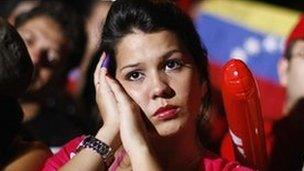Frustration for Chavez over poll
- Published

Some "Chavistas" were in sombre mood as the election results were announced
The first sign that not everything had gone the way of Hugo Chavez's United Socialist Party (PSUV) came when a scheduled news conference with one its key candidates, Aristobulo Isturiz, was cancelled without warning.
By this stage the first bulletin of results, which was expected to take just two hours to be produced, was now more than six hours late, and there was still no sign of an announcement.
Finally, at almost three in the morning on Monday, the president of the National Electoral Council, Tibisay Lucena, came onto the stage and went through the results state by state.
The final picture was a cause for both celebration and disappointment for the Venezuelan leader, Hugo Chavez. He will have welcomed the overall majority the Socialists retained in the National Assembly, and quickly praised a "solid victory" which would "strengthen the Bolivarian revolution" on his Twitter site.
Frustration
But the tweet was a far cry from addressing a jubilant crowd from the balcony of the presidential palace, Miraflores, which at one stage in the evening he looked set to do. Perhaps neither the president nor his supporters felt in the mood.
Chavez voters - dubbed "Chavistas" - will undoubtedly be frustrated at the size of the opposition's representation in parliament. From next to no seats, the opposition parties can now count on at least 62, and have denied Mr Chavez the two-thirds majority he sought.
By taking more than a third of the assembly, opposition deputies will now be in a position to block some of the president's key reforms - be they appointments to the Supreme Court or so-called "organic" laws imposing sweeping changes in areas such as education and local governance.
However, it may be the opposition's claim they have taken 52% of the popular vote which will upset the president's supporters the most.
If it is later confirmed by the electoral council, it represents a significant victory for the opposition who, only a few years ago, were widely considered to be too unattractive to ordinary Venezuelans ever to seriously compete with Mr Chavez's mass appeal.
Prize ahead
To chants of "we are the majority", the head of the umbrella opposition group, MUD, Ramon Guillermo Aveledo, said that their share of the popular vote would "only grow further in the next two years" - a reference to the presidential election in 2012.
But, while the new-look National Assembly is a blow to the Venezuelan leader, it would be a foolhardy commentator who would suggest Mr Chavez will not be able to muster the support he needs in a presidential race.
Mr Chavez is still a popular leader and, while the opposition have clearly learnt a great deal in terms of how best to tackle Mr Chavez at the polls, they still have a long way to go before being seen as a viable alternative national administration.
There were renewed charges of opposition elitism during this election when they - unlike the PSUV - refused to hold primaries to choose the most popular candidates.
A failure to hold primaries for their presidential candidate in 2012, especially if one of the older generation of opposition figures is chosen, would only underline what Mr Chavez has often said about the traditional parties in Venezuela - that they are out of touch with the electorate.
Immediate challenges
However, the presidential race is still two years away and first there are more immediate tests for both sides.
How will Mr Chavez, who has enjoyed unfettered support from the National Assembly over the past five years, take to having to ask his arch-opponents to support reforms they have robustly criticised in the past?
Will the opposition show a degree of flexibility to try to begin to work with the majority Socialists in government?
Will, indeed, the hastily-erected umbrella of the MUD even survive the next parliamentary term or was it simply a marriage of convenience during this campaign?
As those and other questions begin to be answered over the coming months and years, many voters will be hoping that the National Assembly become a more plural legislative body.
And that, if the opposition were serious about tackling their two key campaign topics - rising crime and high inflation - then their deputies will be prepared to cross the aisle to find solutions to those problems.
- Published27 September 2010
- Published25 September 2010